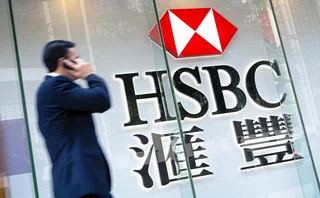
Negative Eonia splits US and EU banks, traders and lawyers
Collateral posters should pay when rates are negative, US banks believe; their European peers are listening to lawyers who say it's not clear cut

During September and October, as Eonia dipped in and out of negative territory, there was a marked difference of tone when talking to US and European banks about whether a poster of euro cash collateral would have to pay rather than receive interest.
As a rule, the US banks assumed lofty, statesmanlike airs, calling on the industry to recognise the importance of the principle at stake – that negative rates are negative rates, and if clearing houses expect a collateral poster to pay interest in those circumstances, so should everyone else.
The European banks were more like school kids who had just managed to stub out and dispose of their cigarettes before the principal walked around the corner. There was a fair amount of smirking and a studied innocence. They were often quite interested in the legal niceties.
It was easy to imagine the conversations between US collateral receivers and European posters during those weeks.
US bank: "We have €3 billion of your collateral. You'll have noticed Eonia is negative. We assume you'll be paying up."
The US banks assumed lofty, statesmanlike airs, calling on the industry to recognise the importance of the principle that was at stake
European bank: "Well, ordinarily, we'd be delighted, but I've just spent two hours talking to our lawyers and they say it's not clear there's an obligation to do so. We're trying to get a definitive answer, of course, but for now we've been instructed not to pay. Yes, yes, I know – I'm as frustrated as you."
Something like that, anyhow.
The divide can be seen in the list of signatories to the negative rates protocol, published by the International Swaps and Derivatives Association in May, which clarifies there is no floor on the interest payable – Bank of America Merrill Lynch, Goldman Sachs, JP Morgan and Morgan Stanley are all on board, but no big European dealers have so far joined them. As of October 29, Danske Bank and ING were the only major European banks to have signed.
Despite all of this, the size of the payments that would be required are small, perhaps running into the hundreds of thousands of euros and possibly touching the millions if Eonia remains negative for any length of time.
When pressed, traders on both sides of the Atlantic hold the same view: if the reference rate is negative, a collateral poster should pay. But lawyers insist the contract does not make that clear, so in the near term it should come as no surprise to see some banks using that defence.
In the longer term, the industry may well get its act together and sign the protocol en masse. But if that happens, I wager it will not be until Eonia is firmly back in positive territory.
Only users who have a paid subscription or are part of a corporate subscription are able to print or copy content.
To access these options, along with all other subscription benefits, please contact info@risk.net or view our subscription options here: http://subscriptions.risk.net/subscribe
You are currently unable to print this content. Please contact info@risk.net to find out more.
You are currently unable to copy this content. Please contact info@risk.net to find out more.
Copyright Infopro Digital Limited. All rights reserved.
As outlined in our terms and conditions, https://www.infopro-digital.com/terms-and-conditions/subscriptions/ (point 2.4), printing is limited to a single copy.
If you would like to purchase additional rights please email info@risk.net
Copyright Infopro Digital Limited. All rights reserved.
You may share this content using our article tools. As outlined in our terms and conditions, https://www.infopro-digital.com/terms-and-conditions/subscriptions/ (clause 2.4), an Authorised User may only make one copy of the materials for their own personal use. You must also comply with the restrictions in clause 2.5.
If you would like to purchase additional rights please email info@risk.net
More on Markets
Volatility selling is down, but not out
Shrinking risk premiums could end cycle of vol suppression, traders say – but not just yet
Futures gain ground in G10 FX pricing
Some market-makers believe contracts are now primary market price for Commonwealth currencies
AI ‘lab’ or no, banks triangulate towards a common approach
Survey shows split between firms with and without centralised R&D. In practice, many pursue hybrid path
Everything, everywhere: 15 AI use cases in play, all at once
Research is top AI use case, best execution bottom; no use is universal, and none shunned, says survey
Citi rolls out revamped SDP in emerging markets
Unified API will boost electronic pricing and automation for restricted currencies, says bank
HSBC appoints Benihasim as global FX head
Hong Kong-based Benihasim replaces Richard Bibbey, who moved to London to run institutional sales
BlackRock bucks trend in shrinking IRS market for Ucits
Counterparty Radar: Pimco boosts pay-fixed book by $27.5 billion in H1 2024
Hong Kong dealers make Honia transition push
Standard Chartered ramps up swaps quoting for Hibor alternative; calls for industry transition group








